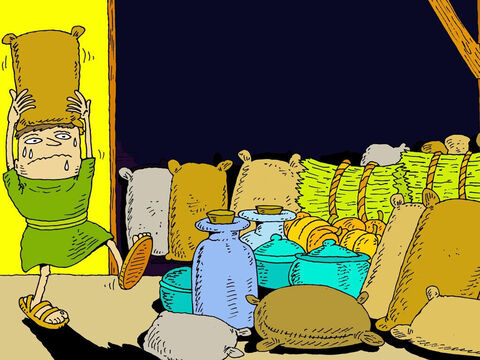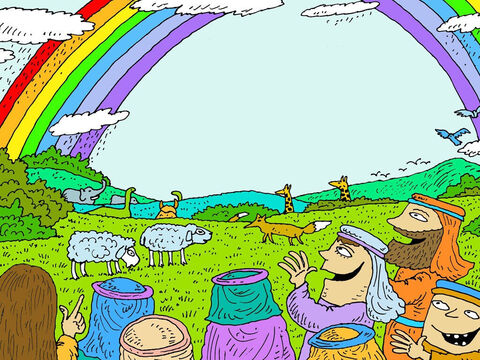![[Picture: “Animals' standing and role in creation is reflected in Noah's Ark” ... Source: Free Bible Images]](https://www.xn--7dbl2a.com/wp-content/uploads/2021/10/תיבת-נח.jpg)
[For articles on the “Sabbath of Noah" in Hebrew, click here]
Updated on October 27, 2022

Rabbi Dr. Yossi Feintuch was born in Afula and holds a Ph.D. in American history from Emory University in Atlanta. He taught American history at Ben-Gurion University.
Author of the book US Policy on Jerusalem.
He is the rabbi of Congregation Shalom Bayit in Bend, Oregon.
* * *
Humankind's immense evildoing on earth required its ''recall'' from ''the production line'' of creation and its being regenerated, even as God chose to accomplish it with a colossal deluge. But inundating the earth would also bring devastation to all land and winged animals, none of which was deemed “evil” or “bad’’, like man proved himself to be, and thus, the very reason for the flood. Ergo, God charges Noah – a “righteous and above-reproach-man” – with building a gigantic ark for the preservation of every such species.
![[Picture: “Animals' standing and role in creation is reflected in Noah's Ark” ... Source: Free Bible Images]](https://www.xn--7dbl2a.com/wp-content/uploads/2021/10/תיבת-נח-2.jpg)
The ark would allow every species (except the many thousands of aquatic or marine lives) to survive the forthcoming killer deluge. Indeed, God gives no discretion to Noah regarding the species that he might not opt to welcome onboard; His sole goal being the preservation of the original creation that God had deemed ten generations earlier as ‘’exceedingly good’’, only to be upended by man alone.
Hence, “all wildlife after their kind, all herd-animals after their kind, all crawling things that crawl upon the earth after their kind, all fowl after their kind, all chirping-things, all winged-things’’ (Genesis 7:14) came to the ark, each species spelled out individually, like distinct nations, rather than being glibly lumped together as one and indistinguishable lot of ‘’the animals’’ – indeed, a show of respect to the fauna that came to Noah upright, rather than as ''nickel-and-dime''.
Moreover, God instructed Noah to bring into the ark seven pairs, rather than one pair, from the ‘’pure’’ species; He must have told Noah what qualified an animal as ‘’pure’’ -- something that the Torah will dilate on much later. But rather than call all species that were not ‘’pure’’ by their antonym, which would be simpler had God used the word ‘’defiled’’ (or tameh in Hebrew), God uses the longer phrase ‘’that are not pure’’, if only to avoid rendering any animal by a degrading or a derogatory adjective, and to, rather, accord it respect.
![[Picture: “Animals' standing and role in creation is reflected in Noah's Ark” ... Source: Free Bible Images]](https://www.xn--7dbl2a.com/wp-content/uploads/2021/10/תיבת-נח-3.jpg)
In the same spirit, Noah was to bring into the ark these animals as “ish v’ishto’’, literally, ‘’a man and his wife’’, reminiscent of the Torah’s reference to the humans themselves. Or alternatively in the words of the Torah: ‘’in pairs they came to Noah into the ark, male and female’’, just like the first reference in the Torah to the human pair: ‘’male and female He created them”; indeed, it is an attestation to the salubrious regard that the Torah has for all the fauna that assembled on Noah’s ark.
As far as food to be stored on board Noah is to “take every food that is eaten… to serve for you and for them as food.” This food is the same plant-based herbivorous food that God had already prescribed to both human and animals on Creation’s “Sixth Day. Significantly, Noah is mentioned before the animals in eligibility to access this food. As it was, both Noah (and his familial detail) were on par with the animals, with Noah having no superior status over them, as though their master, for they were all surviving refugees hunkering down in the ark and depending on Heaven’s grace.
Nonetheless, in order for the humans on the ark to have a virtual higher status than the animals, however subtle, God decreed that Noah and his family would be able to eat, even before the animals, though in normative days that order must be reversed as the Torah will later teach. It was the special privilege given to the humans on board that would distinguish them, if only by a tad bit, from the other species.

The animals who were coming along as passengers -- “two each came to Noah into the ark, male and female” – sensed that their species’ survival was given to the mercy and benevolence of humans.
Interestingly, science has long suggested persuasively that animals intuit natural disasters building up (e.g., before volcanoes explode near a coast or under the sea, a forthcoming touchdown of a tornado, an earthquake, or even a tsunami), and leave the doomed area before it happens, only to return shortly after the natural disaster had struck out. Scientists assert that animals detect pending disasters in nature, let alone the proximity of a predator, before humans do. One theory is that animals feel the earth's vibrations. Another is that they can perceive changes in the air or gases released by the earth.
That the animals in the Noah narrative found his ark as a protective haven from an incoming disaster is a subtle reminder of their intrinsic ability to notice one at real time. Noah’s task, then, as God’s steward, was to see to the preservation of all species, while deriving no material gain from fulfilling this role. In fact, Noah had to invest his own time, efforts and resources in the immense ark project. He fed the animals at his own expense all in the service of God. (One Rabbinic view posits that Noah also took with him on board saplings of figs, olive and grape for replanting presaging the need for them in a reconstituted life on earth.)
![[Picture: Noah’s task, then, as God’s steward, was to see to the preservation of all species, while deriving no material gain from fulfilling this role.… to serve for you and for them as food.” ... Source: Free Bible Images]](https://www.xn--7dbl2a.com/wp-content/uploads/2021/10/תיבת-נח-4.jpg)
Evidently, all species mattered in God’s world; hence, when the calamitous deluge was unleashed the Torah, rather than offhandedly, details again that “all flesh that stirs on the earth perished, [as did] the fowl and the herd-animals, wildlife, and all swarming things that swarm upon the earth, and [lastly] all humans” (Genesis 7:21) – all possessing equally the “breath of the rush of life.” Indeed, rather than summarize briefly the disastrous effects of the flood by saying that all life was lost to the killer-flood, the narrator insists on being specific as to the various species of animals that were blotted out, while referring to humans as a mere additional species, even at the end of the casualties’ list. Moreover, all who perished – the text tells us -- possessed a soul or a spirit of life. Similarly, when the deluge ran its course and it was time to open up the earth for its renewal, the narrator again informs us that “God remembered Noah and every living being…that were with him in the ark”. These other species were high in God’s thoughts, all reckoned with, and far from being transparent in God’s eyes.
Before disembarkation Noah handles most tenderly the dove that was with him, and she in turn becomes a symbol of restoration and revival, and most importantly an iconic symbol of world peace. It isn’t Noah who would symbolize peace, even as God is the very “Maker of peace”, but a dove. And when God commands Noah to exit the ark, the animals are mentioned prominently again among those who should return to the drying earth, even as God expected them now to procreate and increase their numbers, for their own sake, not for the benefit of man.

God proceeds also to proclaim the eternal Rainbow covenant, which judging from the rainbow’s upended posture in the sky it could not be held and directed from heaven to earth, like a dulled sword that could never again be re-used. With such a symbol both humans and non-human animals – all “ensouled” beings in God’s eyes -- would be assured that no future killer-flood, unleashed by God to target the whole earth, would again inundate the earth.
Evidently, the ensouled animals are far from being an afterthought, and God asserts repeatedly in His covenant proclamation that both humans and animals – “all flesh”, that is -- are on His mind. And since this is a paramount lesson from this narrative, we have to reckon with the role of animals in creation not as subservient to man's whims or needs, but as independent fellow creatures whose welfare -- as far as humans can affect it -- is incumbent on us as well, even as it was on Noah.

[For articles on the “Sabbath of Noah" in Hebrew, click here]
מצאת טעות בכתבה? הבחנת בהפרה של זכויות יוצרים? נתקלת בדבר מה שאיננו ראוי? אנא, דווח לנו!


